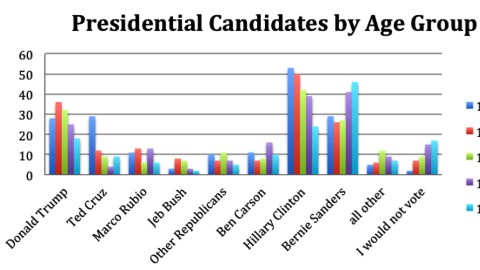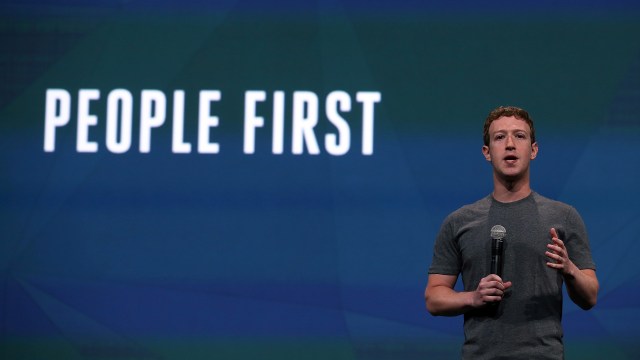Does This Election Break All the Rules of Age-Based Politics?

The marathon race for the presidency is in high gear. Much of the polling has been focused on the Iowa caucuses and New Hampshire primary. National polls and commentary have primarily examined how different candidates fare against each other. Voter party affiliation, income, region, and ethnicity often become the big topics for pundits. What about age? How might different generations vary in terms of their support for different candidates?
The context for the race thus far has been “surprise” for both parties. The 2016 Republican presidential field has been a crowded one, but the story to emerge from it has been the success of political newcomers: first the uptick of support for neurosurgeon Dr. Ben Carson, and second the mass appeal of Donald Trump, the billionaire developer, author, and television personality. On the Democratic side, Hillary Clinton threw her hat in the ring early on, only to be joined by a few others who had not had much exposure on the national political stage: Bernie Sanders, the self-proclaimed socialist senator from Vermont; and Martin O’Malley, the former governor of Maryland. While a few other candidates had entered the race, they had all dropped out of the Democratic primary by early November 2015. Most pundits expected Clinton to dominate the field, and she did — until Sanders began to erode her lead steadily in Iowa, New Hampshire, and across the U.S.
The MIT AgeLab conducted a national online survey of 1,010 participants born between 1946 and 1997 between December 30, 2015, and January 7, 2016. The sample was stratified by generation and gender. Self-reported registered voters (N=833) were asked: “If the election for U.S. president were held today, who would you vote for?” Response options included all of the Republican and Democratic candidates in the race at the time, along with options for “Other” and “I would not vote.” The results are summarized in the figure below.

In some respects, the results are not at all surprising. Consistent with years of political data and political science research, younger registered voters — the Millennials — reported that they would be more likely not to vote in the election. However, what is worth noting is that voters do not necessarily support candidates closest to their age or part of their own generation.
Trump’s support is relatively consistent across generations, with a bump of additional support coming from younger Boomers and Gen X. This cohort is between ages ~37 to 60 years old.
In contrast, the results indicate that support for Ted Cruz (at age 45 one of the youngest candidates in the race) was stronger among the older Baby Boomers — the oldest cohort in our study.
Clinton’s support was strong primarily with older boomers (~61 to 70 years old) with some support from younger Boomers. Generally, her support eroded across other age groups.
The strongest support for the oldest candidate in the race — the 74-year-old Sanders — came from the youngest voters in our sample — the younger Millennials. The youngest Millennials are generally 20-something voters.
When the final votes are tallied we will know definitively if age matters and how. These findings suggest that age may not necessarily predict in the way we might think — that is, younger voters supporting younger candidates and older generations supporting older candidates. These survey results indicate that voters do not necessarily vote for a mirror image of their own age. The relatively young Cruz is receiving core support from the oldest cohort. In sharp contrast, the oldest candidate to run for the presidency, Sanders, is drawing the support of the nation’s youngest voters. Age matters for many things, but chronological age may not be a definitive predictor of political attitudes. In November, we will see if it predicts actual voting behaviors.
—
MIT AgeLab’s Lisa D’Ambrosio contributed to this article





